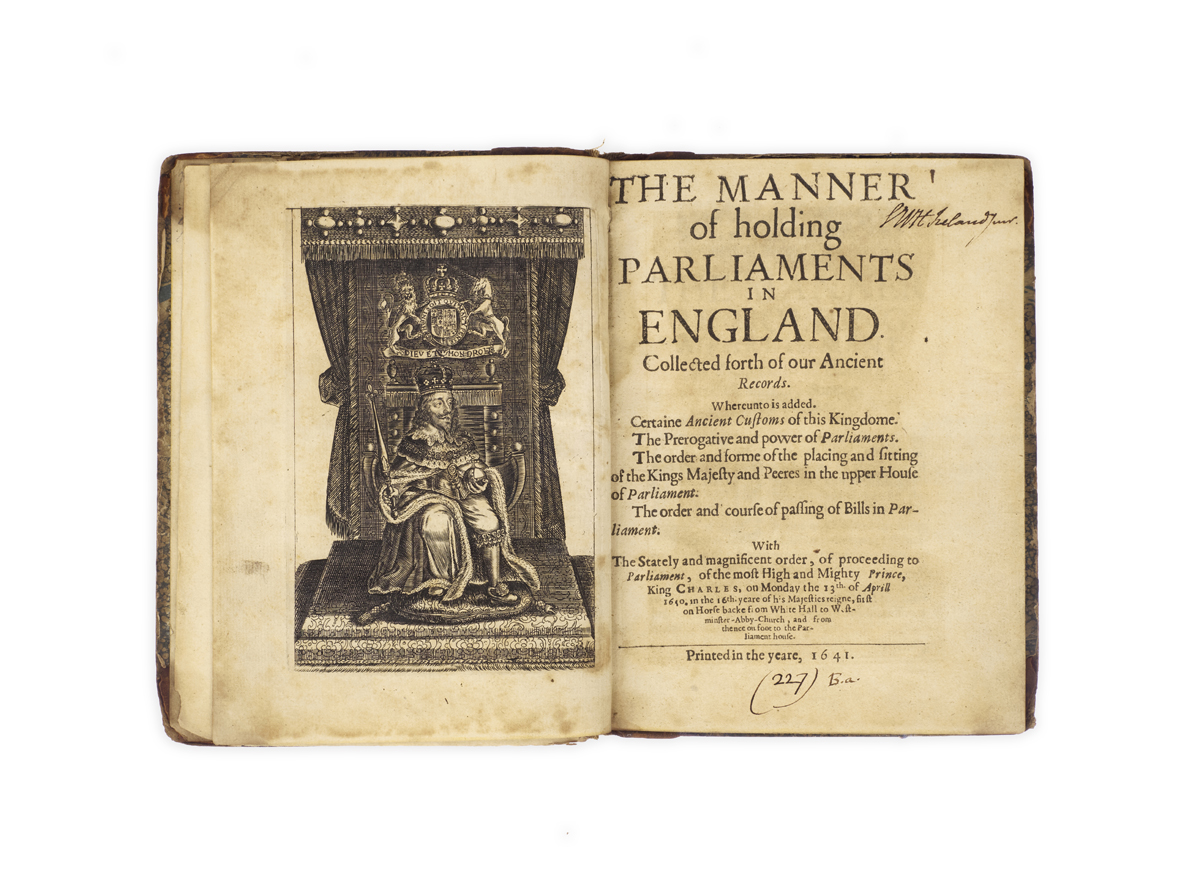A SHAKESPEARE FORGER’S COPY
[HAKEWILL, William].
The Manner of holding Parliaments in England, collected forth of our ancient Records … With the stately and magnificent Order, of proceding to Parliament, of the most high and mighty Prince, King Charles, on Monday 13th of Aprill 1640 … first on Horse back from White Hall to Westminster-Abby-Church, and from thence on foot to the Parliament House.
[London,] Printed in the Yeare, 1641.
4to, pp. [60], with a fine frontispiece portrait of King Charles seated on his throne with the regalia; D3 is a cancel, stub visible; some mild foxing, but a good copy in nineteenth-century half calf, rather worn, later cloth spine; ownership signature ‘SWH Ireland Junr’ on title-page.

Added to your basket:
The Manner of holding Parliaments in England, collected forth of our ancient Records … With the stately and magnificent Order, of proceding to Parliament, of the most high and mighty Prince, King Charles, on Monday 13th of Aprill 1640 … first on Horse back from White Hall to Westminster-Abby-Church, and from thence on foot to the Parliament House.
First (and only lifetime) edition, signed on the title-page by the notorious forger of ‘Shakespeare’s Library’, William Henry Ireland (1775–1835).
William Henry Ireland, son of the engraver and writer Samuel Ireland and his mistress Anna Coppinger, was articled to a conveyancer at the age of 16, ‘which left him ample time to indulge in self-aggrandizing fantasies of a Gothic nature: he read widely in medieval romances and collected old books and pieces of armour’ (ODNB). A desire to please his credulous, bardolatrous father led Ireland junior to the first of his Shakespeare forgeries in 1794. ‘Using old materials gathered from bookshops and the conveyancer’s office, Ireland rapidly produced a sequence of legal and personal documents from the same supposed source’, then remarkably ‘discovered’ Shakespeare’s library, complete with the playwright’s marginalia. An exhibition of the papers in 1795 was visited and worshipped by some, ridiculed and discredited by others, and Ireland admitted their inauthenticity in 1796, though his father did not at first believe him. Slowly distanced by his father, Ireland junior then progressed to a further career in re-fabricating his forgeries.
Ireland’s illegitimacy, his desperate need for parental validation that was not forthcoming, and the shadow of a deceased brother called ‘Sam’ (his father, who thought William Henry too dull-witted for forgery, also called him by that name), led him sometimes to sign himself as Samuel Ireland junior, or SWH Ireland, as here.
William Hakewill 1575–1655, a relative and executor of Thomas Bodley, was a lawyer and antiquary, and several times an MP, often drawn on for his legal and historical expertise. He was a firm defendant of the rights of Parliament, and the present work included a translation of a fourteenth-century manuscript under the title ‘Modus tenendi parliamentum’, under which title the work was later re-printed – it became a key reference for the parliamentary party in the early stages of the Civil War and was later read by Thomas Jefferson, and quoted from in his Notes on the State of Virginia. An active member of Lincoln’s Inn, Hakewill was at various times keeper of the black book, treasurer, and master of the library.
Wing H214.

